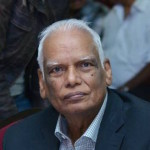Shielding Wijegunaratne Amounts To Abuse Of Power & An Assault On Democracy!

 A fuming President Sirisena summoned a special cabinet meeting just two days after the regular cabinet meeting held on Tuesday, September 11, 2018. On that day the Cabinet adopted a 77-page draft Counter-Terrorism Law presented by Foreign Affairs and Development Assignments Minister Tilak Marapana. This Bill, when passed by parliament, will replace the current Prevention of Terrorism Act of 1978 which vests the police with broad powers to search, arrest, and detain suspects. It was first enacted as a temporary law in 1979 under J. R. Jayewardene presidency, and then made permanent in 1982.
A fuming President Sirisena summoned a special cabinet meeting just two days after the regular cabinet meeting held on Tuesday, September 11, 2018. On that day the Cabinet adopted a 77-page draft Counter-Terrorism Law presented by Foreign Affairs and Development Assignments Minister Tilak Marapana. This Bill, when passed by parliament, will replace the current Prevention of Terrorism Act of 1978 which vests the police with broad powers to search, arrest, and detain suspects. It was first enacted as a temporary law in 1979 under J. R. Jayewardene presidency, and then made permanent in 1982.
This is one of the assurances Sri Lanka gave to UNHRC in terms of Resolution 30/1 of October 01, 2015 titled Promoting reconciliation, accountability and human rights in Sri Lanka. The following are some of the key commitments the Government of Sri Lanka undertook to implement within a time frame.
(1) To undertake a comprehensive approach to dealing with the past, incorporating the full range of judicial and non-judicial measures; also the proposal by the Government to establish a commission for truth, justice, reconciliation and non-recurrence, an office of missing persons and an office for reparations;
(2) To uphold the rule of law and to build confidence in the people of all communities of Sri Lanka in the justice system, notes with appreciation the proposal of the Government of Sri Lanka to establish a judicial mechanism with a special counsel to investigate allegations of violations and abuses of human rights and violations of international humanitarian law, as applicable; affirms that a credible justice process should include independent judicial and prosecutorial institutions led by individuals known for their integrity and impartiality; and also affirms in this regard the importance of participation in a Sri Lankan judicial mechanism, including the special counsel’s office, of Commonwealth and other foreign judges, defence lawyers and authorized prosecutors and investigators.
(3) To accelerate the return of land to its rightful civilian owners, and to undertake further efforts to tackle the considerable work that lies ahead in the areas of land use and ownership, in particular the ending of military involvement in civilian activities, the resumption of livelihoods and the restoration of normality to civilian life, and stresses the importance of the full participation of local populations, including representatives of civil society and minorities, in these efforts;
(4) To a political settlement by taking the necessary constitutional measures, encourages the Government’s efforts to fulfil its commitments on the devolution of political authority, which is integral to reconciliation and the full enjoyment of human rights by all members of its population; and also encourages the Government to ensure that all Provincial Councils are able to operate effectively, in accordance with the thirteenth amendment to the Constitution of Sri Lanka;
(5) To sign and ratify the International Convention for the Protection of All Persons from Enforced Disappearances without delay, to criminalise enforced disappearances and to begin issuing Certificates of Absence to the families of the missing as a temporary measure of relief.
Although some progress has been made to comply with Resolution 30/1, the Government has been dragging its feet over the above commitments. The Government has not done anything about (2) above. An independent investigation into war crimes committed during the war is a pre-requisite for genuine reconciliation. However, the President has taken the stand that the army has not committed war crimes and no member of the armed forces will be put on trial courts with foreign judges.

